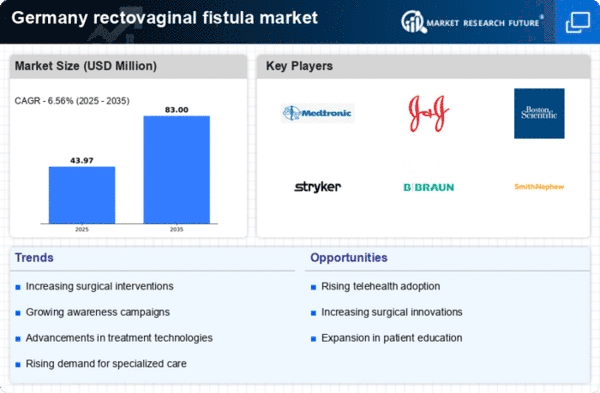Growing Awareness and Advocacy
The rise in awareness and advocacy for women's health issues is influencing the rectovaginal fistula market. Non-profit organizations and healthcare campaigns are actively educating the public about the condition, its causes, and available treatments. This increased awareness is likely to lead to more women seeking medical help, thereby driving demand for surgical and non-surgical solutions. The rectovaginal fistula market is expected to benefit from this trend, as healthcare providers respond to the growing need for effective treatment options. The potential for market expansion is significant, with estimates suggesting a 6% increase in patient consultations over the next few years.
Increased Healthcare Expenditure
Germany's commitment to healthcare spending is a significant driver for the rectovaginal fistula market. With healthcare expenditure projected to rise by 4% annually, there is a growing allocation of funds towards specialized treatments and surgical interventions. This financial support enables hospitals and clinics to invest in advanced technologies and training for healthcare professionals. Consequently, the rectovaginal fistula market benefits from enhanced service delivery and improved patient care. The focus on quality healthcare services is likely to lead to a more robust market environment, with an expected increase in the number of procedures performed.
Advancements in Medical Technology
Technological advancements in surgical procedures and medical devices are propelling the rectovaginal fistula market. Innovations such as minimally invasive surgical techniques and improved suturing materials enhance patient outcomes and reduce recovery times. The introduction of robotic-assisted surgeries has shown promising results, with studies suggesting a decrease in complication rates by up to 30%. As hospitals in Germany adopt these technologies, the rectovaginal fistula market is likely to experience increased investment in training and equipment, further driving market growth. The overall market value could reach approximately €50 million by 2027, reflecting the impact of these advancements.
Rising Incidence of Rectovaginal Fistulas
The increasing incidence of rectovaginal fistulas in Germany is a primary driver for the rectovaginal fistula market. Factors such as childbirth complications, pelvic surgeries, and inflammatory bowel diseases contribute to this rise. Recent studies indicate that approximately 1 in 1,000 women may develop this condition post-delivery, highlighting a significant healthcare concern. As awareness grows, healthcare providers are more likely to seek advanced treatment options, thereby expanding the market. The rectovaginal fistula market is expected to see a surge in demand for surgical interventions and innovative therapies to address this issue, potentially leading to a market growth rate of around 5% annually.
Regulatory Support for Innovative Treatments
Regulatory bodies in Germany are increasingly supportive of innovative treatments for rectovaginal fistulas, which is a crucial driver for the market. Streamlined approval processes for new surgical techniques and medical devices encourage manufacturers to invest in research and development. This regulatory environment fosters innovation, leading to the introduction of novel therapies that can improve patient outcomes. The rectovaginal fistula market stands to gain from this supportive framework, as it may lead to a broader range of treatment options available to patients. The market could see a growth trajectory of approximately 7% as new products enter the market.
















